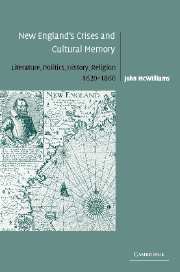Book contents
- Frontmatter
- Contents
- Acknowledgments
- Introduction: Crisis rhetoric: exclusion in New England history
- PART ONE PLANTATION AND SETTLEMENT
- 1 Of corn, no corn, and Christian courage
- 2 Thomas Morton: phoenix of New England memory
- 3 Trying Anne
- PART TWO TIME OF TROUBLES
- PART THREE REVOLUTION
- Epilogue: “bodiless echoes”
- Notes
- Index
2 - Thomas Morton: phoenix of New England memory
Published online by Cambridge University Press: 22 September 2009
- Frontmatter
- Contents
- Acknowledgments
- Introduction: Crisis rhetoric: exclusion in New England history
- PART ONE PLANTATION AND SETTLEMENT
- 1 Of corn, no corn, and Christian courage
- 2 Thomas Morton: phoenix of New England memory
- 3 Trying Anne
- PART TWO TIME OF TROUBLES
- PART THREE REVOLUTION
- Epilogue: “bodiless echoes”
- Notes
- Index
Summary
To turn from the Starving Times of first arrival to the razing of Merry Mount is to shift perspective from opera seria to opera buffa, from unspeakable crisis to overwritten scuffle, from inner trial of the communal spirit to public trial of the outsider. Famine had been a crisis within the body and the soul; Merry Mount was a passing controversy later elevated for purposes of group self-definition into a crisis. Bradford, Endicott, and Winthrop strove to eliminate from New England all that Merry Mount might represent, first by alleging a wide spectrum of Thomas Morton's villainies, then by extraditing him. Morton's revenge was to try to deprive the “precise Separatists” of all significance by using Cavalier literary satire to serve the legal end of revoking the Massachusetts Bay Company's charter. This was a war of unforgettable words that was to reduce the sporadic quasimilitary actions, but not the underlying theological politics, to burlesque.
The great irony of Morton's prominence in New England legend is that the purposes of both historical antagonists would utterly fail. Just as Morton was extradited from Massachusetts three times, yet died in New England after his third return, so the shrill clarity of Bradford's and Winthrop's denunciations would highlight Morton's memory, not obscure it. Similarly, even though Morton may insist upon the beauty, fertility, and erotic power of the New English Canaan, both his satire and his outrage depend on his assuming, from the outset, that “Nature's Masterpeece” has been handed over to the defacing hand of the Puritan.
- Type
- Chapter
- Information
- New England's Crises and Cultural MemoryLiterature, Politics, History, Religion, 1620–1860, pp. 44 - 73Publisher: Cambridge University PressPrint publication year: 2004



